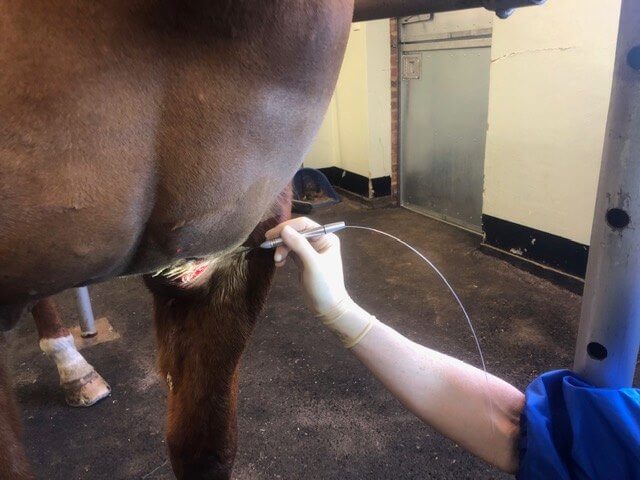Sarcoids are the most common type of skin tumour in horses, accounting for 40% of all equine cancers. Sarcoids vary in size, severity and behaviour, and various treatments are available. This blog article outlines what sarcoids are; the different types of sarcoid and the various sarcoid treatment options. It also covers why sarcoids should always be investigated and treated by a vet.
What Are Sarcoids?
Sarcoids are cancerous lumps that affect the skin. They are linked to bovine papilloma virus (BVP) and whilst any horse can carry BVP, only genetically susceptible horses will go on to develop sarcoids. Some people believe that sarcoids can be spread from horse to horse, but there is currently no evidence to suggest that this is the case.
Sarcoids are locally invasive, meaning they can grow and spread on the skin. However, they do not spread to other organs. They generally appear on the head, groin, and chest, but they can develop anywhere on the skin.
Types of Sarcoid
There are six main types of sarcoid in horses. Each type looks and behaves differently, meaning they each require different treatments.
Occult sarcoids tend to be very slow growing and may remain unchanged for years before requiring intervention. They are usually circular in appearance, and are sometimes mistaken for ringworm, scars or areas where tack has rubbed.
Verrucous sarcoids are wart-like and greyish in appearance. They may appear as singular growths or in clusters.
Nodular sarcoids may have a wide or narrow base, and their behaviour can change over time. They are spherical in shape and have medium growth rate. Nodular sarcoids may be ulcerated or covered by normal skin.
Fibroblastic sarcoids tend to appear in clusters. They are fast-growing, with an irregular appearance. Fibroblastic sarcoids tend to be ulcerated and can develop from other types of sarcoid.
Malignant sarcoids are uncommon, but they are the most aggressive type of sarcoid. They spread via the lymph nodes and tend to appear in lines as they spread from the original tumour site.
Mixed sarcoids are a combination of the above types of sarcoid.
Sarcoid Treatment Options
There are various treatment options available for sarcoids. However, the treatment used will depend on the location, type and severity of the sarcoids. Not all treatments are appropriate for all circumstances, so it is important that sarcoids are properly investigated by a vet.
Interfering with a sarcoid, either through biopsy or accidental trauma, can aggravate the sarcoid, causing it to grow and develop into a more serious type of sarcoid. Therefore, your vet will probably seek to make a diagnosis using visual assessment rather than through a biopsy.
Medical treatments, including chemotherapy creams and injections, may be used to treat some sarcoids. Some topical medicines can be administered by the owner under the guidance of a vet, whilst other treatments must be administered by a vet. The BCG vaccine, which is used to prevent tuberculosis, may also be used to treat some sarcoids. However, the BCG vaccine carries a risk of allergic reaction.
Surgical treatment options include surgical excision, cryosurgery and laser surgery. Laser sarcoid removal surgery can often be done under standing sedation and local anaesthetic, which removes the risks associated with a general anaesthetic. However, the suitability of standing sedation will depend on the size and location of the sarcoids, as well as the horse’s temperament.
In some cases, where a sarcoid is very small and does not appear to be causing additional issues, your vet may recommend monitoring the sarcoid before commencing treatment. Some sarcoids do not grow or change for many years. However, should the sarcoid develop further, your vet may then recommend one of the above treatments.
Do Sarcoids Go Away on Their Own?
In very rare cases, sarcoids have been known to self-cure. However, you should always have sarcoids investigated by a vet. The vast majority of sarcoids will not go away without treatment.
Can Sarcoids Be Treated Using Home or Natural Remedies?
There are plenty of claims and suggestions surrounding various “home remedies” or “natural remedies” for sarcoids. However, there is no evidence that any of these work. Crucially, incorrect treatment of sarcoids can make them worse and potentially cause additional unnecessary suffering to the horse. You should not attempt to treat sarcoids yourself; always get your vet to investigate and treat sarcoids.
Sarcoid Investigation and Treatment at Avonvale Equine Vet Practice
Our experienced and dedicated equine vets are able to investigate and treat sarcoids Our equine vet clinic features full abd carry out surgical sarcoid removal with standing laser surgery. Patients and clients also benefit from our excellent pre- and post-operative care as well as our weekly free zone visits. Register your horse, pony, donkey or mule with our equine vet clinic today.









